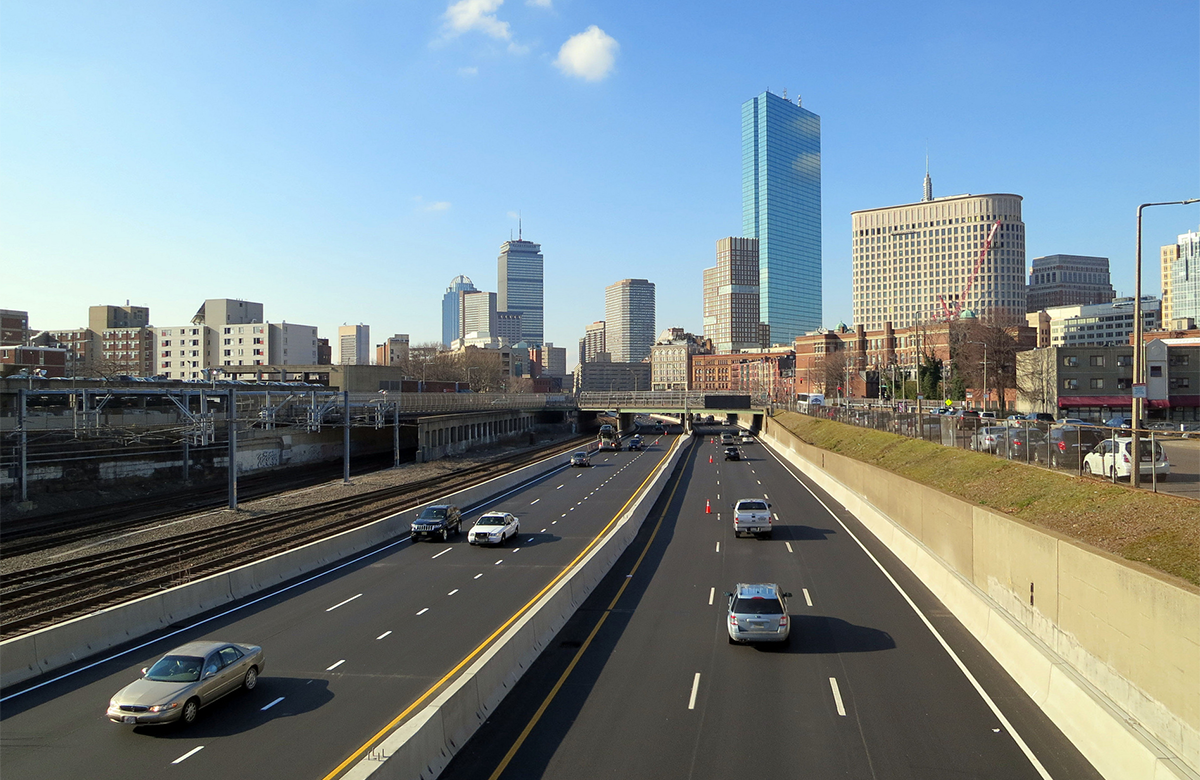The Inconvenient Truth About Olympic Highway Lanes

Boston (Cropped) by Daniel Lobo on Flickr/Creative Commons
Just two months before Boston submitted its bid to host the 2024 Summer Olympics to the United States Olympic Committee, Norway pulled out of bidding for the 2022 Winter Olympics upon receiving a laundry list of outrageous demands from the International Olympic Committee. Least ridiculous of these (The IOC called for a smorgasbord of seasonal fruit from Norway, in February) was the creation of special IOC highway lanes.
A fixture of every Games since Sydney after Atlanta traffic made some athletes late for events, these lanes would be traveled solely by IOC members, foreign dignitaries, Olympic staff, athletes, media, and sponsors like Coca-Cola. In London during the 2012 Games, drivers and cyclists caught in the Olympic lanes were slapped with a £130 fine, and ambulances were allowed passage only if they were responding to emergency calls. Ever-cheeky Londoners nicknamed them “Zil lanes,” after the black limousines that filled special road lanes for Communist Party members in the old Soviet Union.
Because no one wants to walk from the Back Bay to Buzzards Bay, organizers are now recalibrating their marketing of the bid from “walkable” to one of the most compact Olympics ever proposed. At Boston 2024’s Bid 2.0 unveiling Monday—panned by the New York Times for being glaringly incomplete in scope—CEO Rich Davey said that despite an increasing number of venues located across the state, the bid would not request additional highway capacity.
Then where would the lanes go?
“MassDOT is pleased that Boston 2024 has released a far more extensive plan and we look forward to working with the expert team Governor Baker has tapped to thoroughly examine that plan,” a spokesman for MassDOT told Boston when asked if bid organizers have consulted the agency on possible lane closures.
“A lot of people don’t know that a core part of the Olympic proposal is that you reserve lanes on your major roads and highways for the IOC, officials, dignitaries, and athletes,” says Chris Dempsey, co-chair of No Boston Olympics. He says IOC members like Sheikh Tamim Bin Hamad Al-Thani of Qatar, a country currently embroiled in scandal over a sporting event bigger than the Olympics, cruising past Massachusetts commuters is merely an insult to a $300 million injury: “Taxpayers are being asked to pick up those costs. The insult is, ‘We’re going to take lanes from your highways, and you’re not going to use it.’ The injury is, ‘You’re the guys who’re going to have to foot the bill for that cost.'”
Dempsey says Boston 2024 moved $300 million earmarked for “Transportation during Games” and listed under its private budget in plans leaked to the Boston Globe in November, to its public budget in the bid book submitted to the USOC in December, “assumed to be covered by the federal government.” He confronted Davey about it in their June 23 debate on WBZ-AM 1030, and Davey didn’t necessarily object.
“Transportation, in that instance, was a security cost, which we’ve been very clear about, Dan,” Davey told Nightside host Dan Rea. “In order to pay for security, we need the federal government’s assistance. And that is happening for national special security events, the Democratic National Convention, for the Super Bowl.”
Though a spokesperson for Boston 2024 could not be reached for comment, Bid 2.0 did include a small section on past host city’s methods for traffic control:
- “Mass media encouraging citizens and tourists to use public transportation and carpooling”
- “Flexible hours at local businesses”
- “Rerouting long-haul trucking around the city”
- “Intelligent highway systems technology”
- “Manually-controlled traffic lights”
- “New one-way streets in busy areas to create better flow”
“When they say ‘mass media encouraging citizens and tourists to use public transportation and carpooling,’ that’s not the main message,” Dempsey says. “The main message is, don’t go to work.” In Rio de Janeiro, site of the upcoming 2016 Olympics, Mayor Eduardo Paes said he would ask the city’s largest employers to hold a “holiday period” coinciding with the Games to help cut down on traffic. Leading up to the 2004 Democratic National Convention, whose associated closures affected nearly 40 miles of local roads, Mayor Tom Menino similarly recommended that Bostonians work from home. From a 2004 edition of the Herald:
Mayor Thomas M. Menino and others said the city’s best hope might be to frighten people with tales of nightmare traffic jams so many commuters leave town on vacation or call in sick during the Democrats’ summer parley.
“What we’re doing is ringing the alarm bell and saying the sky is falling,” Menino said.
“I think the real answer is going to be they’re going to tell people to stay home from work,” Dempsey says. “That’s what they did in London. That’s what they’re doing in Rio. That’s what they would do in Boston. Don’t come to work, essentially shut down your business, and go on vacation for three weeks.”
Another demand shirked by Oslo: special entrances and exits to and from the airport for IOC members. Will Baron Pierre-Olivier Beckers-Vieujant of Belgium have his own route in and out of Logan?
One thing is certain: Boston 2024 faces a balancing act between a Massachusetts public ceaselessly clamoring for frugality, and an international organization— that counts real life Bond villain Sepp Blatter and three other members of FIFA’s Executive Committee as members—that demands no expense be spared.
Clarification: An earlier version of this story did not include athletes and media as users of the Olympic lanes.


